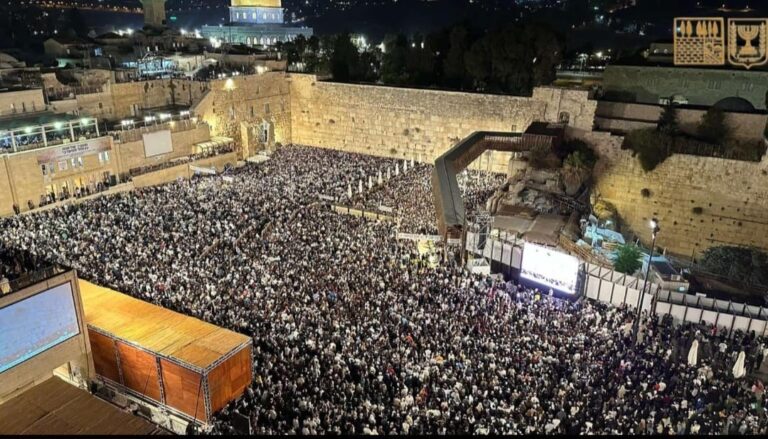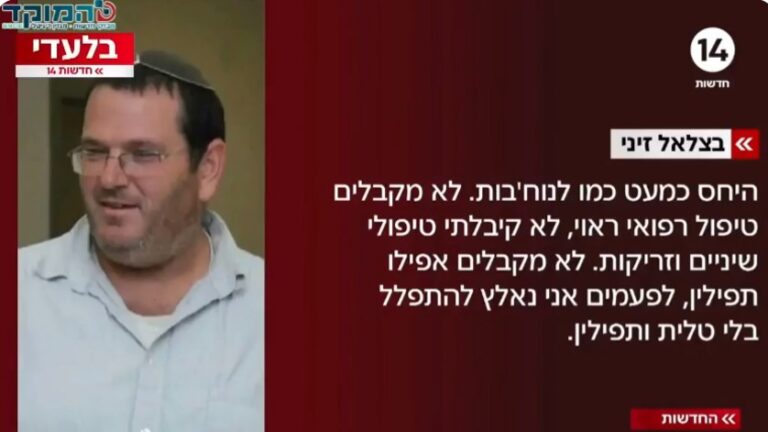 Shiur Given for the Yartzeit of Rebbitzen Pesha Leibowitz A”H
Shiur Given for the Yartzeit of Rebbitzen Pesha Leibowitz A”H
by Rabbi Yair Hoffman for the Five Towns Jewish Times
The 28th of Sivan (June 15th, 2015) marks the 11th yartzeit of Rebbitzen Pesha Leibowitz a”h, wife of Rav Henoch Leibowitz zt”l, the Rosh Yeshiva of Yeshivas Chofetz Chaim, and granddaughter of Rav Naftoli Trop zt”l. Rebbitzen Leibowitz assisted her husband in building many Mosdos of Torah and served as an aim haYeshiva, the mother to all of the Yeshiva’s Talmidim. Often, when an out-of-town Talmid took sick, she took that Talmid into her home and took care of him until he recovered. After my surgery, I personally was a recipient of her kindness.
Rebbitzen Pesha Leibowitz herself was an extraordinary mechaneches in her own right, and taught thousands of Bnos Yisroel for many years for Rav Meir Levi zt”l who headed the Bais Yaakov that was to be renamed Bais Yaakov D’Rav Meir.
After her grandfather had passed away at a young age, her father Rav Avrohom Trop zt”l took over the Yeshiva and was later the Karliner Rosh Yeshiva.
During the war, Rav Avrohom Trop and his family were in Siberia, where the difficulties were extraordinary. She had befriended a widowed mother and looked after her two children after the widow had passed away. Rebbiten Pesha Leibowitz is sorely missed by the thousands of Talmidim that were close to her.
In the merit of her Neshama, below is a translation of a shiur her grandfather, Rav Naftoli Trop zt”l, on the Daf Yomi tractate of Nedarim. This shiur was delivered when he was the Rosh Yeshiva of the Chofetz Chaim’s Yeshiva in Radin, Poland. May her neshama be a mailitz yosher on all of her husband’s Talmidim and those who were influenced by them. Amain.
Getting a Handle on Yad L’Tzedaka
Translated by Rabbi Yair Hoffman
Rav Naftoli Trop zt”l (1871-1928 – yartzeit 3 Tishrei), Rosh Yeshiva of the Chofetz Chaim’s Yeshiva in Radin, Poland, cites a Gemorah in Nedarim (7a) in a published shiur. The Gemorah asks whether there are shortcut Nedarim for Tzedakah or not. The Gemorah leaves the question unresolved.
DISPUTE BETWEEN RAN VERSUS RAMBAN AND RASHBA
The Ran (Ul’inyan Halacha) cites the Ramban who says that since it involves a question of Issur – we are stringent. He explains that this is also the view of the Rashba. The Ran himself argues on their view, and proves that all cases of safek matanos aniyim are considered cases of money in doubt – sfaika d’mamona, and we are lenient just as in all other cases of monetary disputes.
QUESTION ON RAN
Rav Trop zt”l asks on the Ran that every case of safek matanos aniyim also involves the issue of safek issur not just safek mammon. There is the prohibition of bal yachel and bal te’acher! If so, then we should be stringent – not lenient!
Indeed, for this very reason, the Nesivus HaMishpat (Dinei Tfisah Klal 2) rules that any question in Matanos Aniyim must be dealt with stringently since it is a question of the prohibitions of Bal Yachel and Bal te’acher. There is no comparison to other cases of monetary doubt – where even though there may be an issue of “Lo sigzol” – it is nonetheless not a problem because the Torah did not forbid the issue of safek gezel. The Ran’s view thus requires analysis.
Rav Ephraim Navon zt”l (1677-1735), Rav of Constantinople and author of the Machaneh Efraim questions (Hilchos Tzedakah siman 2) whether we say “Amirah litz’daka is like mesira l’aniyim or not. He correlates this issue to the debate between the Ran and the Rashba.
The Av Beis Din of Slonim, Rav Yehoshua Yitzchok Shapira zt”l (1801-1873), author of the Emek Yehoshua (Siman 16) also explains the Ran as holding that Amirah litzdaka is like mesira, just like the Machaneh Efraim. He continues that according to this – it is not considered safaik issurah at all.
Why?
Because even if we say that there is Yad for tzedakah, it is already money that belongs to the aniyim. There is no longer an issur of bal yachel or bal te’acher. He has already fulfilled his Neder!
PROBLEM
There is a problem on this, however, from the Gemorah in Rosh HaShana (6a). There the Gemorah states explicitly that even if one says “Afrish velo Akriv – I will separate the animal but I won’t actually bring it up as a korban” – he has violated bal te’acher.
It is mashma from there that the same will be true with tzedakah – if you say, “I will separate it but not physically give it to them” he is in violation of bal te’acher. Yet, according to what the Emek Yehoshua writes it is not possible to be in violation of bal te’acher because he has already fulfilled his neder and the money is considered in the possession of the poor people. The notion of Bal Te-achair is not applicable. We must say that it is clear from the Gemorah that even though the money belongs to the aniyim and he has already fulfilled his vow, nonetheless, since he is holding onto it through his neder and has not handed it to them – he is in violation of Bal Te’achair.
TUREI EVEN’S QUESTION ON RAISH LAKISH
*Reb Aryeh Leib Ben Asher Gunsberg (1695- 1785, also known as the Shages Aryeh) in his Turei Even (Rosh HaShana 4a) asked a question regarding Raish Lakish’s opinion cited in Chulin (139a). Raish Lakish holds that if a person was makdish a manah to Bedek Habayis, he is not responsible for it financially – how can we ever have a case of Bal Te’achair?
ATTACK ON TUREI EVEN’S QUESTION
The truth is that his question is not a question because the Gemorah there in Chulin asks according to Raish Lakish from the Bayis zeh alai korban to Bedek HaBayis, and the house collapsed – he is obligated to pay. The Gemorah answers, This is only true [that he is responsible for payment] when the house had collapsed, but when the item is still extant wherever it may be – it is considered as if it is in the Bei Gazah of the Merciful One.
HE HASN’T FULFILLED THE NEDER
It is clear that even according to Raish Lakish he has not fulfilled his neder with just the separation, the hafrasha of it. Because if so, why would he be obligated when it is not extant anymore? He has already fulfilled his neder!
Rather, Raish Lakish holds regarding the obligation to pay – as long as it still is extant in the Bei Gazah he is exempt from payment.
According to this, we can say that even according to Raish Lakish he can be in violation of Bal Te’acher in bedek habays even after the hafrasha. Why? Because he had as yet not fulfilled the neder.
It is clear from the words of the Turei Even who wrote that whenever he has already fulfilled the neder the prohibition of Bal Te’acher does not apply.
This is also the rationale of the Emek Yehoshua mentioned earlier. However, we have already written that this is impossible to say, because according to this there would never be a case of Bal Te’acher where he first separated it and didn’t give it the recipients according to those who hold in regard to Tzedaka that Amirah is like giving it over.
If so, perforce it must be that the parameters of Bal Te’acher when he separated it but didn’t give it yet is that he is obligated to give them what became their money through his neder.
CHAZAKAH REMOVES THE PROHIBITION
It would appear to explain that whenever we say that cases of Safaik Mammon we deal with them leniently even though, in reality, they deal with a possible prohibition of Lo Sigzol – stealing – this issue may be explained as follows:
In any situation of doubt we follow a Chazakah to resolve the doubt. For example, a safaik aishes ish, we establish her on her previous chazakah – being a single girl. The same is true regarding Safaik Mammon – we establish the money on its chazakah status and the safaik is resolved.
This is what we say that Safaik Mammon we deal with leniently, that is to the person being sued – the person suing cannot take money from him based upon a doubt. After the situation has been ruled upon leniently – based upon the principle of Chazakah – there is no further violation of Lo sigzal because the money is his.
According to this explanation, it can be said that when there is a safaik in Matanos aniyim, if we ruke regarding tzedaka that Amirah is considered like giving it to them – so this money is considered safaik mammon of the aniyim and we are lenient toward the person who is being sued to rule on the doubt just like any other case of money in doubt. It is like it is his own money and there is no problem of bal te’achair.
According to what we have explained, the parameters of Bal Te’acher where it was separated but not yet given – is that he is obligated to give what has become their money to them. Here, the ruling (based on the Chazakah) is that it is NOT considered mammon aniyim, just as there is no prohibition of Lo Sigzol. There is no prohibition of Bal Te’acher because the prohibition is only on Mammon Aniyim.
EXPLAINING THE RAN AND RASHBA
The Ran could very well hold that it is like general Safaik Mammon, where we are lenient and there would be no prohibition.
The Rashba, however, holds that we do not say in regard to tzedakah that Amirah is like giving it. Therefore, the parameters of Bal Te’acher isn Tzedakah is even in his own money where he is obligated to give these funds to Aniyim on account of his neder. When there is a safaik in the neder he must still give it to them because it involves a possible prohibition – the prohibition of Bal Te’acher. He is obligated to be stringent just like in any other possibility of issur – prohibition. This is the explanation of the Machaneh Efraim who connected it to the debate between the Ran and the Rashba with whether we say Amirah for Aniyim is like having given it over to them or not.
The translator can be reached at [email protected]











4 Responses
May she be a מליצת יושר for all of klaal Yistael.
What would be so terrible if you put a picture of the nifteres herself? It’s not like you never put pictures of women as nearly everyday you post pics of Clinton. Besides we could all benefit seeing what a Rebbitzen from the previous Dor looked like.
Did miss something did no she had a beard but she had her head covered.
End the madness
One could argue that “seeing what a Rebbitzen from the previous Dor looked like” does have some value, though, in my humble opinion, certainly not to the extent that it overrides Kol kevuda bas melech penima.
But one cannot reasonably argue that Kol kevuda bas melech penima should be overridden just because YWN also shows pictures of, lihavdil, gentile female politicians to whom this does not apply.